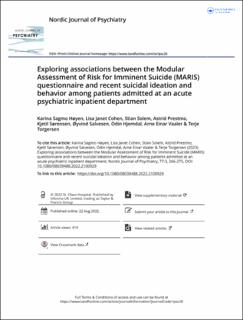| dc.contributor.author | Høyen, Karina Sagmo | |
| dc.contributor.author | Cohen, Lisa Janet | |
| dc.contributor.author | Solem, Stian | |
| dc.contributor.author | Prestmo, Astrid | |
| dc.contributor.author | Sørensen, Kjetil | |
| dc.contributor.author | Salvesen, Øyvind | |
| dc.contributor.author | Hjemdal, Odin | |
| dc.contributor.author | Vaaler, Arne | |
| dc.contributor.author | Torgersen, Terje | |
| dc.date.accessioned | 2023-04-25T11:23:37Z | |
| dc.date.available | 2023-04-25T11:23:37Z | |
| dc.date.created | 2022-11-07T08:49:56Z | |
| dc.date.issued | 2023 | |
| dc.identifier.citation | Nordic Journal of Psychiatry. 2022, . | en_US |
| dc.identifier.issn | 0803-9488 | |
| dc.identifier.uri | https://hdl.handle.net/11250/3064914 | |
| dc.description.abstract | Purpose The aim of the present study was to investigate the psychometric validity of the Modular Assessment of Risk for Imminent Suicide (MARIS) questionnaire in relation to recent suicidal ideation and behavior among a sample of patients admitted to an acute psychiatric inpatient department in Norway. Methods The MARIS was completed within the first 24 h after admission by 338 patients and their clinicians. Information on recent suicidal ideation and behavior was extracted from patients’ medical charts. Two out of four MARIS modules, the Suicide Trigger Scale Short-Form (STS-SF; modified version), and the Therapist Response Questionnaire Short-Form (TRQ-SF) demonstrated good internal consistency. The relationships between the STS-SF, addressing symptoms of the suicide crisis syndrome, and the TRQ-SF, exploring therapist emotional responses, and recent suicidal ideation was investigated by logistic regression analysis. Results In the logistic regression analysis including pre-selected diagnoses, age, and gender as covariates, both STS-SF and TRQ-SF showed significant associations with recent suicidal ideation (inclusive of suicidal behavior in 27% of the patients with suicidal ideation). Conclusion Both the STS-SF and the TRQ-SF showed concurrent and incremental validity with regard to suicidal ideation. This is the first study showing the cross-cultural validity of the MARIS and supports its clinical utility as a suicide risk assessment tool in inpatient settings. Additionally, this study adds to the literature supporting the value of assessing clinicians’ emotional responses to high risk patients. | en_US |
| dc.language.iso | eng | en_US |
| dc.publisher | Informa UK Limited | en_US |
| dc.rights | Navngivelse 4.0 Internasjonal | * |
| dc.rights.uri | http://creativecommons.org/licenses/by/4.0/deed.no | * |
| dc.title | Exploring associations between the Modular Assessment of Risk for Imminent Suicide (MARIS) questionnaire and recent suicidal ideation and behavior among patients admitted at an acute psychiatric inpatient department | en_US |
| dc.title.alternative | Exploring associations between the Modular Assessment of Risk for Imminent Suicide (MARIS) questionnaire and recent suicidal ideation and behavior among patients admitted at an acute psychiatric inpatient department | en_US |
| dc.type | Peer reviewed | en_US |
| dc.type | Journal article | en_US |
| dc.description.version | publishedVersion | en_US |
| dc.source.volume | 77 | en_US |
| dc.source.journal | Nordic Journal of Psychiatry | en_US |
| dc.source.issue | 3 | en_US |
| dc.identifier.doi | 10.1080/08039488.2022.2100929 | |
| dc.identifier.cristin | 2069696 | |
| cristin.ispublished | true | |
| cristin.fulltext | original | |
| cristin.qualitycode | 1 | |

